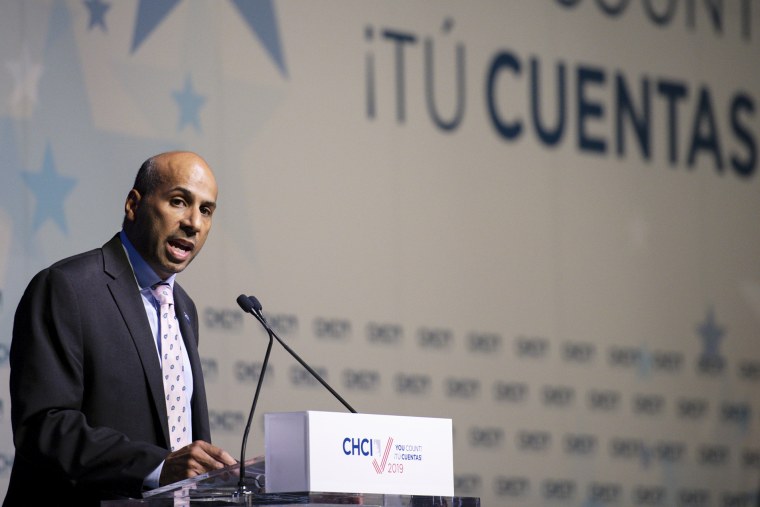WASHINGTON — Latino economic advancement, leadership development for young Hispanics, and Latino health care after Covid-19 are among the issues that will be discussed at one of the largest virtual gatherings of Latino leaders this year.
“We serve as a platform for the exchange of ideas and how to best tackle issues and come up with solutions. An example is environmental justice, and how is climate impacting Latinos and other communities of color,” said Marco Davis, CEO and president of the Congressional Hispanic Caucus Institute, which is bringing several thousand participants to its 44th-annual conference starting Monday.
“We have to ensure that the people most affected by climate are part of the conversation around solutions; that the response to climate control is inclusive and doesn’t leave our community out," Davis told NBC News.
Another topic up for discussion in the role of immigration and the workforce. Immigrants, many of them Latino, had a more significant role that previously thought — such as essential workers during the pandemic.
The institute is the nonprofit arm of the Congressional Hispanic Caucus dedicated to leadership development, primarily in young Latinos.
The group is using social media much more heavily to reach out to young people and emerging leaders in the community. The most recent Census Bureau figures found that Latinos and other minorities comprise more than half of the country’s total youth population, with young Hispanics encompassing 26 percent of the nation’s residents under age 18 and a much greater share in several states, including Arizona, California, Florida and California.
“Our alumni are considered ‘ambassadors’ to help reach out to young people and emerging leaders in the community,” and make sure the young are ongoing participants and have a voice in the conversation, process and results, he said.
Participants will be looking at “lessons learned” from the 2020 election, how states are responding to redistricting after the 2020 census, and tackling misleading information, disinformation and the lack of information, which is not reported about as much, according to Davis.
The institute is also part of Proyecto 20%, a coalition of Latino groups advocating for a greater number of Latinos and Latinos in senior-level positions in the Biden administration.
While Cabinet positions are more high profile — the current Cabinet has four Hispanic members — there are nearly 5,000 presidential appointments that include some of the key deputy directors and assistant secretary posts which involve overseeing the day-to-day operations and policy development and its implementation at the agency and departmental levels.
Hispanics have filled several of those positions, but many remain vacant.
"The Latino community is nearly 20 percent of the population and should be 20 percent of the political appointments up and down the line in the Biden administration," said Davis. "We’re pleased that four Latinos are in the Cabinet, but we have not let up. We need people at the sub-Cabinet level, we need folks at the director level, all the way down to special assistant."
CHCI has been reaching out to their alumni and to other young professionals to act as a "pipeline" for potential appointees.”
Tackling racism, role of Afro Latinos
Davis is one of the few Afro Latinos in a national leadership role and not only considers the topic of race and equity — including discrimination within the community — personally important, but also one that requires greater attention.
“I don’t get asked enough about the issue of race in the Latino community. While it’s been a quantum leap in the last few years that we’re talking about it, there’s still work to be done and it’s something we need to fix, which wasn’t something people said years ago," said Davis.
“Years ago people weren’t sure what to say, they avoided the conversation. But the fact that we’re having conversations about it is a radical change, especially compared to the past," he said. "That’s what I tell young Afro Latinos, that we are so much more visible now but we need to tackle racism within our own community — that wasn’t an issue people thought was a problem years ago, and we have to recognize the diversity within our own community."
Virtual — and more accessible
While this gathering is the second time the conference won't be held in person, Davis considers that somewhat of a silver lining.
"We’ve taken it online and made it available to everyone and anyone everywhere, we saw many more people signing on last year who weren’t the ‘usual’ crowd. They weren’t the people who come to Washington on a regular basis," he said. "Going virtual has been one of our biggest opportunities to broaden our message and bring more people into the conversation and say to people, these are the issues that need to be addressed."
Though Davis acknowledged that face-to-face meetings, networking, side conversations and group huddles can't be duplicated virtually, he said certain things like live streaming some events would probably continue, even when an in-person conference resumes.
Last year’s virtual conference saw 4,000 participants sign on, and while the final numbers aren’t in for this week’s gathering, organizers say they expect to match or even surpass that of last year.
President Joe Biden will address the group Thursday in a recorded message and House Speaker Nancy Pelosi will also speak to the conference that day.
Sylvia Mendez, whose family's successful lawsuit fighting an all-white California school was a precursor to Brown v. Board of Education will received the medallion award at the group’s annual awards gala Thursday. “Latinos were receiving a substandard education, and her case struck a blow against inequity and changed the trajectory of the population,” Davis said.
Follow NBC Latino on Facebook, Twitter and Instagram.
